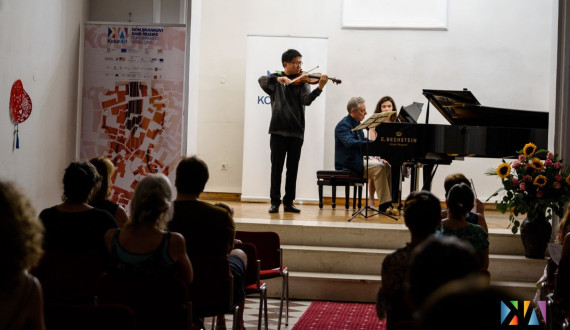China Stage Lived up to the Expectations of the Audience
This year’s thematic segment of the KotorArt Don Branko’s Music Days called the China Stage ended with the performance of the Chinese violinist Dan Zhu and the French pianist Michel Dalberto. On Tuesday, August 2, in the Church of the Holy Spirit, the artists performed the works of Wolfgang Amadeus Mozart, Bright Sheng and Richard Strauss.

After a solo recital, held two weeks ago, of the young Chinese pianist Chen Junyan, a graduate student at the Royal Academy of Music in London, Dan Zhu performed within the China Stage program segment. He came to KotorArt with a significant festival experience, as he has already been invited to perform at many prestigious festivals, among which stand out the Salzburg Festspiele, Enescu in Bucharest, as well as the Verbier Festival. Despite his young age, he has so far collaborated with numerous famous artists, including pianists Philippe Entremont and Lang Lang, as well as Michel Dalberto, who was a student of the famous pedagogue Vladislas Perlemuter and is considered one of the key followers of the great French piano school founded by Alfred Cortot.
Dan Zhu and Michel Dalberto performed three stylistically different works, starting from classicism and then making a turn from contemporary music to romanticism. Violin Sonata in F major, K. 377 (374e), written by Wolfgang Amadeus Mozart when he was 25 years old, is part of a set of six sonatas in which the composer for the first time significantly pointed out that both instruments are equally important. Already in the first movement, the artists channeled the driving energy with the movement in triplets interwoven in both parts in favor of showing the interpretive superiority and compatibility of chamber music. On the other hand, Violin Sonata in E-flat major by Richard Strauss gave artists the opportunity to show a different, romantic aesthetic, with the beauty of lyrical melodies and a multitude of different technical requirements. The violinist particularly stood out in the second movement of the Strauss Sonata, performing melodies that simulate improvisational practices and that meditatively cease into silence. In the finale, both artists in a virtuosic “rivalry” brought the work to an explosive end, although the volume was often (also during the performance of other pieces) in favor of the pianist.
The artists also presented a work by a contemporary Chinese author of the older generation. Namely, the American composer of Chinese origin, Bright Sheng, known for mixing Western European and Chinese cultural idioms in his work, in 2006 wrote the piece Three Fantasies for Violin and Piano. Through Dream Song, Tibetan Air and Kazakhstan Love Song, the artists presented the characters and temperaments of different Asian climates tamed by the contemporary musical language and compositional poetics of Bright Sheng.
Judging by the warm applause and the resulting encore, this year’s selection of artists for the China Stage, which, like previous years, is organized in cooperation with Chinese cultural institutions and the Chinese Embassy in Podgorica – lived up to the expectations of the audience.
